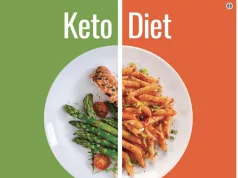Is diet soda keto? This question has become increasingly relevant as the ketogenic diet, a high-fat, low-carbohydrate eating plan, gains popularity. The keto diet encourages the body to burn fat for energy instead of carbohydrates, leading to a state called ketosis. However, the presence of artificial sweeteners in diet soda has raised concerns about their potential impact on ketosis and overall health.
This article delves into the complex relationship between diet soda and the ketogenic diet. We will explore the principles of keto, examine the effects of artificial sweeteners on blood sugar and gut health, and discuss the potential benefits and risks of consuming diet soda while following a ketogenic lifestyle. We will also provide alternatives to diet soda and emphasize the importance of consulting with a healthcare professional for personalized advice.
Diet Soda and Ketogenic Diets: Is Diet Soda Keto

The ketogenic diet, often referred to as keto, is a high-fat, low-carbohydrate diet that forces the body to enter a metabolic state called ketosis. This state occurs when the body begins to burn fat for energy instead of carbohydrates, leading to weight loss and other potential health benefits.
The Principles of the Ketogenic Diet
The ketogenic diet is based on the principle of drastically reducing carbohydrate intake while increasing fat intake. This shift in macronutrient ratios forces the body to enter a state of ketosis, where it starts utilizing fat as its primary energy source. This process involves the production of ketones, which are produced in the liver from fat and serve as an alternative fuel source for the brain and other tissues.
The Role of Carbohydrates, Protein, and Fat in a Ketogenic Diet
The ketogenic diet prioritizes fat as the primary source of energy, significantly reducing carbohydrate intake and maintaining moderate protein consumption.
Carbohydrates
On a ketogenic diet, carbohydrate intake is typically restricted to 20-50 grams per day, depending on individual factors such as activity level, body composition, and goals. This strict limitation forces the body to deplete its glycogen stores (stored carbohydrates) and turn to fat for energy.
Protein
Protein intake on a ketogenic diet is typically moderate, ranging from 15-25% of daily calories. Protein plays a crucial role in maintaining muscle mass, promoting satiety, and supporting various bodily functions.
Fat
Fat constitutes the majority of calories on a ketogenic diet, typically ranging from 70-80% of daily intake. This high fat intake provides the body with a readily available source of energy and helps maintain satiety.
Macronutrient Ratios in Keto
The typical macronutrient ratios for a ketogenic diet are as follows:
* Fat: 70-80%
* Protein: 15-25%
* Carbohydrates: 5-10%
These ratios can vary slightly based on individual needs and goals. However, the core principle remains the same: significantly reducing carbohydrates, maintaining moderate protein intake, and increasing fat consumption to induce ketosis.
Artificial Sweeteners in Diet Soda
Diet soda, marketed as a calorie-free alternative to regular soda, often relies on artificial sweeteners to achieve its sweet taste. These sweeteners are designed to provide sweetness without the sugar content, making them appealing to those watching their calorie intake or managing blood sugar levels. However, the potential effects of these artificial sweeteners on health have been a subject of ongoing research and debate.
Artificial Sweeteners in Diet Soda
Artificial sweeteners are synthetic compounds that mimic the sweetness of sugar without providing the same caloric content. They are commonly used in diet soda and other sugar-free products. Some of the most common artificial sweeteners found in diet soda include:
- Aspartame: Aspartame is one of the most widely used artificial sweeteners, often found in diet sodas, chewing gum, and other sugar-free products. It is about 180 times sweeter than sugar and is metabolized by the body, providing a negligible amount of calories.
- Sucralose: Sucralose is another popular artificial sweetener, known for its sweetness that is about 600 times greater than sugar. It is not metabolized by the body and therefore does not contribute to calorie intake.
- Saccharin: Saccharin is an older artificial sweetener, known for its intense sweetness, about 300 times that of sugar. It is often used in diet sodas, but its use has declined in recent years.
- Acesulfame Potassium (Ace-K): Ace-K is a non-nutritive sweetener that is about 200 times sweeter than sugar. It is often used in combination with other sweeteners, such as aspartame, to enhance the sweetness profile.
Potential Effects of Artificial Sweeteners on Blood Sugar Levels
While artificial sweeteners do not contain sugar and do not directly contribute to blood sugar spikes, some studies suggest that they may have indirect effects on blood sugar regulation.
- Altered Gut Microbiota: Some research suggests that artificial sweeteners may alter the composition and function of the gut microbiota, which plays a crucial role in regulating blood sugar levels. These changes in gut bacteria may lead to altered glucose metabolism and potentially contribute to insulin resistance.
- Increased Appetite: Some studies have observed that artificial sweeteners can stimulate appetite and lead to increased food intake. This could potentially contribute to weight gain and elevated blood sugar levels over time.
- Hormonal Changes: There is some evidence that artificial sweeteners may trigger hormonal changes that affect blood sugar regulation. For example, they may stimulate the release of insulin, even in the absence of sugar, which could potentially lead to insulin resistance.
Impact of Artificial Sweeteners on Gut Health and Microbiome
The gut microbiome, the collection of trillions of bacteria residing in the digestive tract, plays a vital role in overall health, including blood sugar regulation, immunity, and digestion. Some research suggests that artificial sweeteners may disrupt the delicate balance of the gut microbiome.
- Changes in Bacterial Composition: Studies have shown that artificial sweetener consumption can alter the composition of gut bacteria, potentially leading to an imbalance in the microbial community. This imbalance can disrupt the normal functioning of the gut and may have implications for overall health.
- Increased Inflammation: Some research suggests that artificial sweeteners may contribute to inflammation in the gut, which can be associated with various health issues, including metabolic disorders.
- Alterations in Gut Permeability: The gut barrier plays a crucial role in preventing harmful substances from entering the bloodstream. Some studies indicate that artificial sweeteners may increase gut permeability, potentially allowing harmful substances to enter the bloodstream and contribute to inflammation and other health problems.
Diet Soda and Ketosis
The ketogenic diet, or keto diet, is a popular weight-loss plan that involves drastically reducing carbohydrate intake and replacing it with fat. This forces the body to enter a metabolic state called ketosis, where it begins to burn fat for energy instead of carbohydrates. While the keto diet is generally considered safe, some individuals may be concerned about the potential impact of diet soda on ketosis.
Artificial sweeteners in diet soda can potentially disrupt ketosis by affecting insulin and glucagon levels. These hormones play a crucial role in regulating blood sugar levels and energy metabolism.
Impact of Artificial Sweeteners on Insulin and Glucagon Levels
Artificial sweeteners can stimulate the release of insulin, a hormone that helps lower blood sugar levels by promoting glucose uptake into cells. While this might seem counterintuitive, as diet soda does not contain sugar, studies have shown that artificial sweeteners can trigger a similar response in the body as sugar. This is because the body is designed to recognize sweetness as a signal for an impending influx of glucose, and it prepares accordingly.
Insulin also plays a role in fat storage. When insulin levels are elevated, the body is more likely to store fat instead of burning it for energy. This could potentially hinder the process of ketosis, where the body is meant to utilize fat as its primary fuel source.
Conversely, artificial sweeteners can also suppress the release of glucagon, a hormone that raises blood sugar levels by promoting the breakdown of glycogen (stored glucose) in the liver. Glucagon plays an important role in ketosis by stimulating the breakdown of stored fat into ketones, which can be used as an alternative fuel source.
A study published in the journal *Diabetes Care* found that consuming artificial sweeteners led to a decrease in glucagon levels and an increase in insulin levels, potentially interfering with the metabolic pathways involved in ketosis.
Studies on Diet Soda and Ketosis
Several studies have investigated the effects of diet soda on ketosis. While the results are not entirely conclusive, some studies have suggested that diet soda may interfere with the process of ketosis.
A study published in the *American Journal of Clinical Nutrition* found that individuals who consumed diet soda had higher levels of insulin and lower levels of glucagon compared to those who did not consume diet soda. This suggests that diet soda may have a negative impact on ketosis by altering hormone levels.
It is important to note that these studies are limited in scope, and further research is needed to fully understand the impact of diet soda on ketosis. Factors such as the type of artificial sweetener used, the amount consumed, and individual metabolic differences can all influence the results.
Potential Benefits and Risks of Diet Soda on Keto
While the ketogenic diet emphasizes consuming healthy fats and limiting carbohydrates, the role of diet soda in this context remains a topic of debate. Diet soda, with its zero-calorie content, can be appealing to those following a keto diet, but it’s crucial to understand its potential benefits and risks.
Potential Benefits of Diet Soda on Keto
Diet soda can potentially benefit individuals on a ketogenic diet by helping them manage their calorie intake and potentially aiding in weight loss.
- Reduced Calorie Intake: Diet soda provides zero calories, making it a suitable alternative to sugar-sweetened beverages that can significantly contribute to calorie intake and hinder weight loss goals.
- Appetite Control: Some studies suggest that diet soda may help curb appetite and reduce food cravings, potentially leading to lower overall calorie consumption and aiding in weight management.
- Improved Blood Sugar Control: The absence of sugar in diet soda can help maintain stable blood sugar levels, which is beneficial for individuals managing diabetes or other metabolic conditions.
Potential Risks of Diet Soda on Keto
While diet soda may seem like a harmless alternative on a keto diet, several potential risks associated with its consumption have been raised.
- Gut Health Disruption: Artificial sweeteners in diet soda may disrupt the balance of gut bacteria, potentially leading to digestive issues and inflammation.
- Increased Cravings: Some research suggests that artificial sweeteners may trigger cravings for sweet foods, potentially hindering the adherence to a ketogenic diet.
- Metabolic Changes: Long-term consumption of diet soda may be linked to metabolic changes, such as increased insulin resistance and a higher risk of developing type 2 diabetes.
Alternatives to Diet Soda on Keto
While diet soda can be a tempting option for those following a ketogenic diet due to its zero-calorie and zero-carb content, it’s not without its potential drawbacks. Fortunately, there are several keto-friendly beverages that can provide a refreshing alternative without compromising your dietary goals.
Keto-Friendly Beverage Alternatives
A variety of keto-friendly beverages can offer refreshing hydration and flavor without compromising your ketogenic diet. These alternatives can provide different flavors, textures, and nutritional benefits, allowing you to choose options that best suit your preferences.
Table of Keto-Friendly Beverage Alternatives
| Option | Description | Potential Benefits | Potential Drawbacks |
|---|---|---|---|
| Water | The most basic and essential beverage for hydration. | Calorie-free, zero-carb, and essential for overall health. | May not be as flavorful as other options. |
| Sparkling Water | Carbonated water that can be flavored with natural fruit or herbs. | Provides a refreshing and bubbly sensation. | Some flavored versions may contain added sugars or artificial sweeteners. |
| Unsweetened Tea | A variety of teas, including black, green, and herbal, are naturally keto-friendly. | Provides antioxidants and can be enjoyed hot or cold. | Some varieties may contain added sugars or artificial sweeteners. |
| Coffee | A popular beverage that can be enjoyed black or with a keto-friendly sweetener. | Provides a caffeine boost and can be enjoyed hot or cold. | Can be acidic and may cause digestive discomfort in some individuals. |
| Bone Broth | A nutrient-rich broth made from simmering bones, cartilage, and other connective tissues. | Provides electrolytes, collagen, and other nutrients. | May have a strong savory flavor that not everyone enjoys. |
| Unsweetened Almond Milk | A plant-based milk alternative that is low in carbs and calories. | Provides a creamy texture and can be used in smoothies or coffee. | May not be suitable for individuals with nut allergies. |
| Keto-Friendly Protein Shakes | Shakes made with protein powder, low-carb milk alternatives, and keto-friendly sweeteners. | Provides protein, electrolytes, and can be a convenient meal replacement. | May be more expensive than other options. |
Examples of Keto-Friendly Beverages
- Water with lemon or lime: A simple and refreshing way to add flavor to water. The citrus fruit provides a tangy twist and a source of vitamin C.
- Sparkling water with a splash of unsweetened cranberry juice: A flavorful and festive option that provides a burst of antioxidants.
- Iced tea with a squeeze of lemon: A refreshing and thirst-quenching beverage that can be enjoyed hot or cold.
- Black coffee with a teaspoon of heavy cream: A classic and satisfying beverage that provides a caffeine boost and a creamy texture.
- Bone broth with a sprinkle of herbs: A nutrient-rich and savory beverage that can be enjoyed hot or cold.
- Unsweetened almond milk with a scoop of protein powder and a few berries: A creamy and protein-packed smoothie that can be enjoyed as a meal replacement or snack.
Pros and Cons of Keto-Friendly Beverage Alternatives
- Water: Water is the most basic and essential beverage for hydration. It is calorie-free, zero-carb, and essential for overall health. However, it may not be as flavorful as other options.
- Sparkling Water: Sparkling water provides a refreshing and bubbly sensation. It is generally calorie-free and zero-carb, but some flavored versions may contain added sugars or artificial sweeteners. It’s important to check the ingredients list to ensure that the sparkling water you choose is keto-friendly.
- Unsweetened Tea: Unsweetened tea is a great option for those who enjoy a more flavorful beverage. It provides antioxidants and can be enjoyed hot or cold. However, some varieties may contain added sugars or artificial sweeteners. It’s best to choose unsweetened tea varieties or make your own tea at home.
- Coffee: Coffee is a popular beverage that can be enjoyed black or with a keto-friendly sweetener. It provides a caffeine boost and can be enjoyed hot or cold. However, coffee can be acidic and may cause digestive discomfort in some individuals. It’s important to listen to your body and adjust your coffee intake as needed.
- Bone Broth: Bone broth is a nutrient-rich broth made from simmering bones, cartilage, and other connective tissues. It provides electrolytes, collagen, and other nutrients. However, bone broth may have a strong savory flavor that not everyone enjoys. You can experiment with different types of bone broth to find one that suits your taste.
- Unsweetened Almond Milk: Unsweetened almond milk is a plant-based milk alternative that is low in carbs and calories. It provides a creamy texture and can be used in smoothies or coffee. However, it may not be suitable for individuals with nut allergies. If you have a nut allergy, you can try other low-carb milk alternatives such as coconut milk or hemp milk.
- Keto-Friendly Protein Shakes: Keto-friendly protein shakes provide protein, electrolytes, and can be a convenient meal replacement. However, they may be more expensive than other options. It’s important to choose protein powders that are keto-friendly and free of added sugars or artificial sweeteners.
Considerations for Individual Health
It’s crucial to remember that everyone’s body is unique, and what works for one person might not work for another. Before making any significant dietary changes, including incorporating diet soda or adopting a ketogenic diet, it’s essential to consult with a healthcare professional. They can provide personalized guidance based on your individual health history, any existing conditions, and current medications.
Potential Interactions with Health Conditions and Medications, Is diet soda keto
Certain health conditions or medications may interact with diet soda or ketogenic diets. For instance, individuals with diabetes may need to adjust their insulin dosages when consuming artificial sweeteners found in diet soda. Similarly, some medications may be affected by the ketogenic diet’s altered metabolic state.
- Diabetes: Individuals with diabetes should carefully monitor their blood sugar levels when consuming diet soda, as artificial sweeteners can impact blood sugar control.
- Kidney Disease: People with kidney disease should be cautious with diet soda, as some artificial sweeteners may place additional strain on the kidneys.
- Migraines: Some individuals report experiencing migraines after consuming diet soda.
- Gastrointestinal Issues: Artificial sweeteners in diet soda can cause digestive discomfort, including bloating, gas, and diarrhea, in some people.
- Medications: Certain medications, such as those for blood pressure or seizures, may interact with the ketogenic diet. It’s crucial to consult with a healthcare professional to ensure the diet is safe and appropriate.
Personalized Recommendations for Specific Health Concerns
It’s crucial to discuss your specific health concerns with your doctor to receive personalized recommendations. They can help you navigate the potential benefits and risks of diet soda and ketogenic diets, considering your individual needs.
- Pregnant and Breastfeeding Women: It’s generally recommended to avoid artificial sweeteners during pregnancy and breastfeeding, as their long-term effects on infants are not fully understood.
- Individuals with Allergies: Some diet sodas may contain ingredients that can trigger allergies, such as aspartame or sucralose.
- Individuals with Mental Health Conditions: Some research suggests that artificial sweeteners may have negative effects on mental health. However, more research is needed to confirm this link.
Closing Notes
Ultimately, the decision of whether or not to consume diet soda on a ketogenic diet is a personal one. While some may find it a helpful tool for reducing calorie intake and cravings, others may prefer to avoid artificial sweeteners altogether. By understanding the potential effects of diet soda on ketosis and overall health, individuals can make informed choices that align with their dietary goals and health priorities.
Helpful Answers
Can diet soda break ketosis?
While diet soda doesn’t directly contain carbohydrates, some research suggests that artificial sweeteners may disrupt the gut microbiome and potentially interfere with ketosis. More research is needed to fully understand the impact of artificial sweeteners on ketosis.
Are there natural sweeteners that are keto-friendly?
Yes, there are several natural sweeteners that are keto-friendly, including erythritol, stevia, and monk fruit. These sweeteners are generally low in carbohydrates and do not significantly impact blood sugar levels.
Is it okay to drink diet soda occasionally on keto?
The occasional consumption of diet soda on a ketogenic diet may not pose a significant risk, especially if you are otherwise adhering to a ketogenic diet plan. However, it’s best to prioritize keto-friendly beverages and consult with a healthcare professional for personalized advice.
While diet soda is often considered keto-friendly due to its lack of carbs, it’s important to remember that artificial sweeteners can have their own set of potential downsides. If you’re curious about alternative approaches to weight management, you might want to explore the concept of “diet of worms,” which involves consuming a diet rich in earthworms.
What is diet of worms is a fascinating and controversial topic, and while it may not be for everyone, it’s certainly a unique approach to healthy eating. Ultimately, the best approach for your keto diet will depend on your individual goals and preferences.
Whether or not diet soda fits into a ketogenic diet is a question that often comes up. It’s a complex topic with various factors to consider. While diet soda is calorie-free, some argue that the artificial sweeteners might disrupt the body’s natural metabolic processes.
But, if you’re looking for a break from the keto diet and need a way to clean those stubborn grout lines in your bathroom, check out this guide on how to clean dirty grout. Back to the diet soda debate, it’s ultimately a personal decision based on individual goals and preferences.
While diet soda is technically keto-friendly due to its lack of carbs, it’s not necessarily the healthiest choice. It’s important to remember that a healthy diet should be balanced and nutritious, just like it is for our furry friends.
Speaking of nutrition, have you ever considered a raw diet for your dog? You can find out more about the benefits and drawbacks of a raw diet here. Ultimately, the best approach for both humans and dogs is to prioritize whole, unprocessed foods, and diet soda, despite its keto-friendliness, doesn’t fit that bill.
























